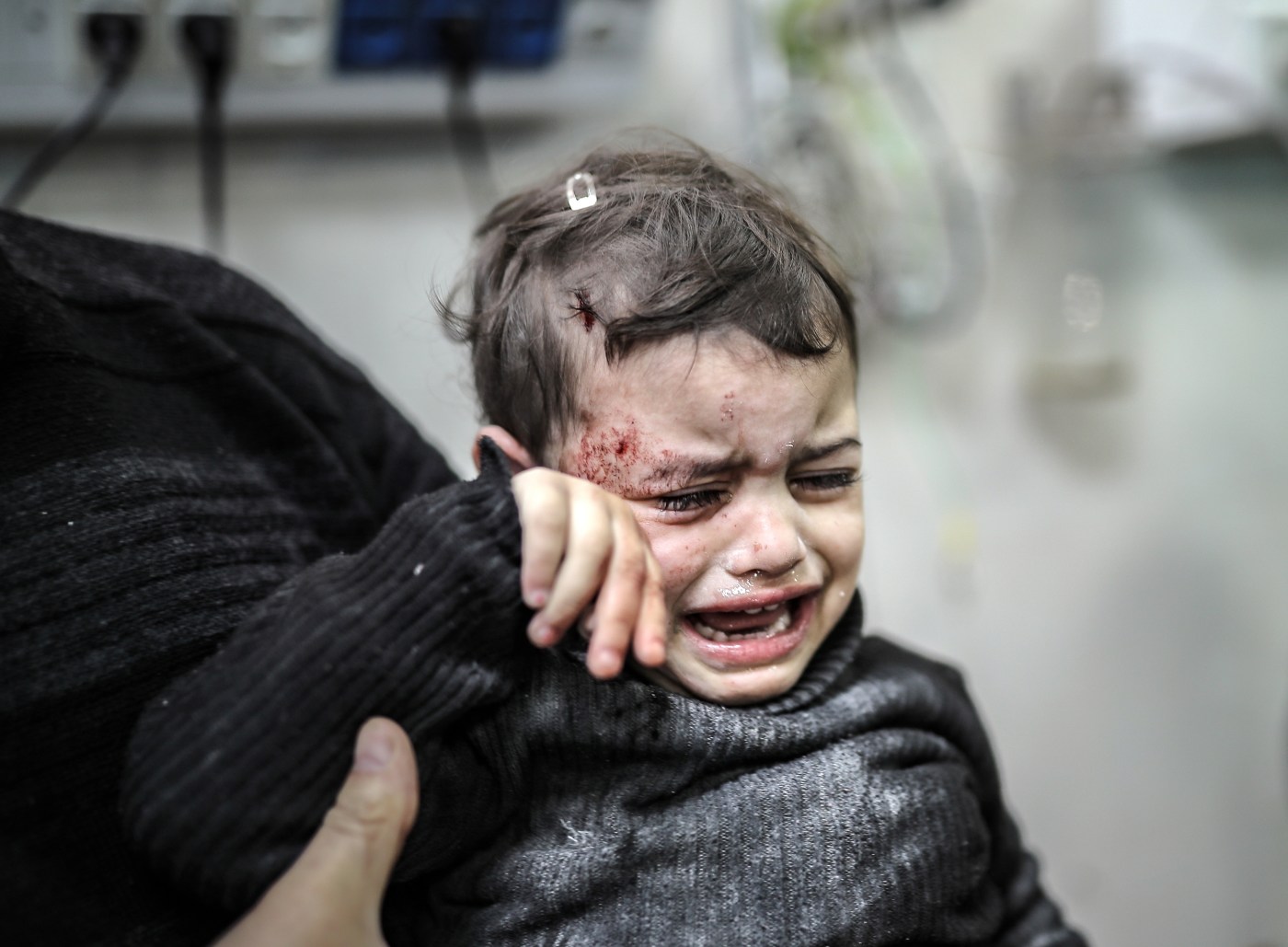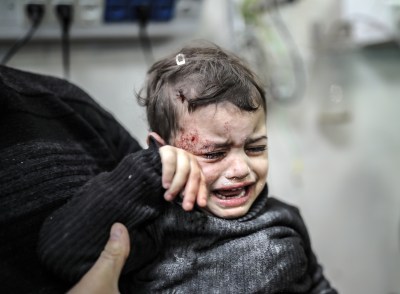Earlier this month, Republican Sen. Lindsey Graham charged Secretary of Defense Lloyd Austin with being “naïve” to warn about unintended consequences of civilian casualties in Gaza. “This is a radicalized population,” Graham told CNN’s Dana Bash. “I don’t want to kill innocent people, but Israel is fighting not just Hamas, but the infrastructure around Hamas.”
That’s why it’s pointless to worry about “inflaming the Palestinians,” the senator added: They’re already murderously antisemitic, and Americans like Austin should stop “telling Israel things that are impossible to achieve,” like bombing fewer Palestinian kids or including the prospect of multigenerational blowback in strategic calculations.
Graham, the ranking member on the Senate Judiciary Committee, may be the most high-profile figure to so explicitly argue against minimizing Palestinian civilian casualties, but he is not unique. A recent Townhall article, approvingly shared by right-wing pundit Mark Levin, argued there are no “innocent Palestinians” because Palestinians “duly elected” Hamas and “rais[e] their children … to hate and murder Jews.” A few weeks ago, GOP Rep. Brian Mast contended—with only slightly more moderation—that “there are very few innocent Palestinian citizens,” and we wouldn’t “so lightly throw around the term ‘innocent Nazi civilians’ during World War II.”
Taken together, there are three claims here:
- That Gazan civilians elected evil leaders and have evil in their hearts.
- That therefore, even if they are indisputably noncombatants, Gazans are not properly innocents and may be killed accordingly.
- That we needn’t worry about radicalization as an unintended consequence because Gazan civilians were already irredeemably evil (see claim 1).
This is a tidy circular argument for killing thousands of children that does not bear up to factual, ethical, or strategic scrutiny.
Let’s start with the facts. October 7 was a grave evil, utterly unjustified, and deserving of fullest condemnation. Without setting aside the labyrinthine history of conflict between Israelis and Palestinians, Hamas is to blame for its bloodthirsty antisemitism in general and this deplorable brutality in particular. The attacks were designed to incite war, and Israel’s present military response wouldn’t be happening otherwise.
It’s after that premise that the case against taking care to protect Palestinian civilians begins to depart from reality—and morality. Gaza has a young population, and Hamas received only a slight plurality of the vote in the 2006 election preceding its 2007 takeover of Gaza. It’s dishonest to say Hamas was “duly elected” via one vote cast nearly two decades ago, before many Gazans were even born. We use that same phrase about elections in liberal countries like the United States, but the way Hamas came to power is nothing like elections in America. Hamas is not a democratic government simply doing the will of the people.
Then there’s the question of Palestinians’ beliefs. What is the will of this people? Just days before the October 7 attacks, polling showed high levels of Palestinian distrust of Hamas. Three quarters said Hamas governance is corrupt; only one quarter said they’d vote for a Hamas leader for president; and about seven in 10 said Hamas is insufficiently responsive to its people.
Still, if Hamas did run a free and fair election in Gaza, the group would undeniably perform well. A survey earlier this year found a slight majority of Gazans approved of armed resistance to Israel. Using data from 2014, the Anti-Defamation League estimates that 93 percent of Palestinians in the West Bank and Gaza are antisemitic.
After the war started, Gazan support for Hamas surged. In one poll, 57 percent said “Hamas was correct in launching the October attack.” And though Gazans overwhelmingly denied Hamas had committed war crimes on October 7, they also overwhelmingly told pollsters they had not seen “videos showing the militants committing atrocities.”
There are all sorts of exceptions to the uglier numbers here, of course. The ADL data is age-stratified, with younger Palestinians less likely to express antisemitic views. Hamas has its critics among older Gazans, too, and Gaza is also home to a small Christian population which is suffering in this war as much as its Muslim neighbors. “We see death everywhere. We smell death everywhere,” one Gazan Christian told Christianity Today, where I work. “[But] in the midst of sadness, pain, and heartbreak, we look at the face of Jesus Christ.”
Yet the exceptions are not the majority. The Christians, who number around 1,000 in a population of more than 2 million, certainly are not. At issue here is the broader population, many of whom do believe—with varying degrees of ignorance and therefore varying degrees of moral culpability—horrible things.
It is about those people that it is most difficult and most necessary to say: A civilian is a civilian. A child who has been brainwashed into rank antisemitism is still a child. We do not classify “innocents” in war by beliefs, as if bombs or bullets could peer into human hearts, where evil always lurks. We classify people by actions, by whether or not they fight. However evil their ideas, innocents in Gaza must not be conflated with Hamas militants or dismissed as nothing more than acceptable collateral damage in pursuit of Israel’s vital security aims. That kind of conflation of civilians and combatants is grotesque and spurious when it is applied to Israeli innocents, and it is grotesque and spurious when applied to Gazans, too.
Mast, the Florida Republican, compared Gazan civilians to civilians in Nazi Germany. It is hypocritical, he suggested, to tell Israel to avoid Palestinian casualties when we would have no such compunctions about German deaths eight decades ago.
But we should and do have compunctions. In the sober light of history, we do not speak so lightly—to borrow Mast’s phrase—about the deaths of enemy civilians in World War II. We do not celebrate U.S. bombings of Dresden and Hamburg, Hiroshima and Nagasaki. British Prime Minister Winston Churchill questioned the bombing of Dresden at the time, critiquing “acts of terror and wanton destruction” and warning that attacks on civilian centers could “do more harm to ourselves in the long run than they do to the enemy’s immediate war effort.” To this day, we assign John Hersey’s Hiroshima to high schoolers, making it impossible to see our bombs’ civilian victims as “the hated enemy or the faceless dead.”
And even among a population that is already angry, killing and maiming civilians (especially children, and especially with very large-scale strikes) can and will make radicalization worse. Contra Graham, Austin was not wrong in his warning that “in this kind of a fight, the center of gravity is the civilian population. And if you drive them into the arms of the enemy, you replace a tactical victory with a strategic defeat.”
“Israel’s collective devastation of Gaza raises deep moral problems,” Robert A. Pape, a University of Chicago political scientist and author of Bombing to Win: Air Power and Coercion in War, wrote in Foreign Affairs last week. “But even judged purely in strategic terms, Israel’s approach is doomed to failure—and indeed, it is already failing.” Pointing to air campaigns past, Pape argued that this failure is exactly what we should expect:
[N]one of the Allies’ efforts to punish civilians en masse actually succeeded. In Germany, the Allied bombing campaign, which took off beginning in 1942, wreaked havoc on civilians, destroying one urban area after another and ultimately a total of 58 German cities and towns by the end of the war. But it never sapped civilian morale or prompted an uprising against Adolf Hitler, despite the confident predictions of Allied officials. Indeed, the campaign only encouraged Germans to fight harder for fear of a draconian postwar peace.
A similar hardening of resolve happened in England, too, after Nazi Germany’s indiscriminate London Blitz. “In fact,” Pape concluded, “never in history has a bombing campaign caused the targeted population to revolt against its own government.” It tends to have the opposite effect.
It’s not difficult to imagine how that happens. I keep returning to a story, reported by Reuters, of a young Palestinian man named Ala al-Kafarneh. He fled his home in northern Gaza “with his pregnant wife, his father, brothers, cousins, and in-laws.” Four days later, an airstrike hit the building where they took refuge, leaving Kafarneh the sole survivor.
Was he pro-Hamas before that strike? Did he endorse October 7? Maybe—I don’t know. What’s certain is that he lost eight family members at once and his baby will never be born.
You don’t need to be a psychologist or a general to understand how this could radicalize him. And you don’t need to be a theologian to understand, as New Testament scholar Esau McCaulley argued for the New York Times, that giving “equal value to human beings on both sides of the conflict does not entail making moral equivalences between Israel and Hamas.”
That includes human beings like Kafarneh’s wife and unborn child as much as the Israelis murdered, brutalized, and kidnapped on October 7. It includes every grief-wrung Jewish father pleading on television for his child to come home—and every Gazan mother bearing a too-small body in a mauve-stained sheet, her wails preserved and silenced in photos round the world.
It is not naïve to admit that violence self-perpetuates, that strategic prudence often entails considerable restraint, that what first seems like just and clearheaded retribution may in hindsight be revealed as reckless and counterproductive revenge. It is not naïve to hate the shedding of innocent blood.






Please note that we at The Dispatch hold ourselves, our work, and our commenters to a higher standard than other places on the internet. We welcome comments that foster genuine debate or discussion—including comments critical of us or our work—but responses that include ad hominem attacks on fellow Dispatch members or are intended to stoke fear and anger may be moderated.
With your membership, you only have the ability to comment on The Morning Dispatch articles. Consider upgrading to join the conversation everywhere.